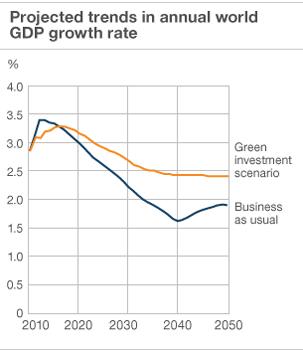Viewpoint: G8 summit needs a green focus
- Published

Tunnel vision: economic "business as usual" has contributed to recent unrest, the writers argue
As the heads of the world's richest nations prepare to meet for the G8 Summit, external in the French town of Deauville, the issue of generating jobs is emerging as a major test for the global economy.
This is especially true for young people.
The kinds of events that have swept through parts of the Middle East and North Africa in recent months stem, in part, from joblessness, and a mood of frustration and a lack of hope among the unemployed and under-employed.
Youth unemployment in many countries of the region hovers around 23-30%, in some cases even higher.
Yet the crisis is not confined to this region or developing countries alone.
In the Eurozone, youth unemployment has jumped from 14% to 20% in the past few years, and in some countries the rates are higher.
Globally, youth account for a quarter of the working age population, but for 40% of the jobless.
Growth is needed to meet this crisis.
But the challenge facing world leaders is how to generate sustainable growth that delivers social outcomes, including employment and greater equity.

Environmental and labour concerns come together in the "green economy", according to the UN
And to do this while keeping humanity's growing environmental footprint within planetary boundaries.
The United Nations Environment Programme (Unep) and the International Labour Organization (ILO), in concert with a wide range of partners, has recently provided an analysis of what a "green economy" could deliver.
Entitled Transition to a Green Economy: Pathways to Sustainable Development and Poverty Eradication, external, it indicates that switching to this kind of low-carbon, resource-efficient economy offers a major opportunity to achieve these multiple aims.
Investing just 2% of global GDP in 10 key sectors can, with the right kinds of enabling public policies, grow the global economy and importantly generate decent "green" jobs.
And this pathway would avoid the shocks, inequities and environmental decline inherent in current economic models.
Energy for change
One of the G8's priorities is energy.
Our analysis suggests that investing about 1.25% of global GDP each year in energy efficiency and renewable technologies could cut global primary energy demand by 9% in 2020, and close to 40% by 2050.
Savings on capital and fuel costs in power generation under a Green Economy scenario would be on average $760 billion a year between 2010 and 2050.
Employment levels in the energy sector would be one-fifth higher than under a business-as-usual scenario, as renewables account for close to 30% of primary global energy demand by mid-century.
The G8 has also identified the rational use of natural resources via waste management and recycling as ways to achieve green growth.
Evidence from around the world indicates enormous job potential here too.
China, for example, aims to create 20 million jobs in afforestation and forest-based tourism over the coming years.

Green technologies can take societies forward into a era of greater employment
Investments in improved energy efficiency in buildings could generate an additional 2-3.5 million green jobs in Europe and the US alone, with the potential much higher in developing countries.
Germany estimates that investments in clean tech, including renewables and recycling, will generate more jobs than exist in the car industry by 2020.
In Brazil, about half a million people are already employed in recycling and waste management.
The industry generates returns of $2bn per year, while avoiding 10 million tonnes of greenhouse gas emissions; a fully recycling economy there would be worth 0.3% of GDP and could provide quality jobs.
Changing times
Our assessments indicate that the green shoots of a green economy are sprouting across the globe and generating new kinds of employment opportunities.
Jobs in some sectors such as fisheries may decline or change as others grow.

Inclusive labour market policies, skills and social dialogue with employers and workers will be crucial.
The G8 summit in Deauville will review implementation within the world's richest economies and several key G20 members in respect to its Global Energy Efficiency Action Initiative, external.
The International Energy Agency has estimated that a great deal has been achieved in meeting the initiative's 25 recommendations since the G8 summit in Germany in 2006.
Yet there are still tremendous opportunities to go further, with only around 55% of those recommendations having been adopted even in countries that have gone furthest.
Thus, more than 40% of the energy savings possible, and by inference job generation opportunities, remain to be realised, especially in respect to transport.
And the potential remains to cut greenhouse gas emissions by 8bn tonnes of carbon dioxide per year by 2030.
Future perfect?
The G8 summit in Deauville comes just over 12 months before the crucial Rio+20 meeting, external in Brazil, where the world will come together to evolve a more decisive response to the challenge of 21st Century sustainable development.
Jobless recoveries are in no-one's interest, as the events in the Arab world and elsewhere are showing.
It is time to accelerate and to scale up the transitions towards a green economy that are already underway.
They represent a running chance of growing the economy without degrading the planet.
They also represent a way of rediscovering social values and stability for hundreds of millions of citizens seeking decent, high-quality and, if possible, green jobs.
Juan Somavia is director-general of the International Labour Organization. Achim Steiner is a UN under-Secretary-General and executive director of the UN Environment Programme
- Published21 February 2011